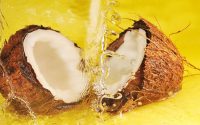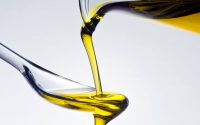Corn oil: an important warning about this vegetable oil
Cooking food is easily damaged by high temperatures. Therefore, the cooking oil you choose must be stable enough to not undergo chemical changes in high temperature environments. Polyunsaturated vegetable oils (including corn oil, rapeseed oil and soybean oil) can form oxidized cholesterol, which can adversely affect your health. Learn about the misunderstanding of using corn oil as a cooking oil and whether it has other beneficial uses?
What is corn oil?
Corn oil is a fat extracted from corn germ and its main use is cooking. It is also a major ingredient in margarine and other processed foods.
Corn is also one of the raw materials for biodiesel. Between 2012 and 2014, non-food grade (NFG) corn oil used to produce biodiesel increased significantly. This oil has other industrial uses.
Corn oil is generally cheaper than other vegetable oils, and one of the main factors is that the United States will provide generous government subsidies for corn cultivation . In the United States, corn was one of the most subsidized crops, with more than $77 billion received from the US government between 1995 and 2010 alone. As a result, it is not surprising that unhealthy foods, such as those containing corn oil and high fructose corn syrup (HFCS), are sold at much lower prices than healthy foods.
I think the problem of using corn oil and other vegetable oils as cooking oil is not only that the oxidized cholesterol they cause can significantly increase your risk of coronary heart disease, but also that these vegetable oils contain a lot of omega-6 fat, which can cause ω in your body. -6 Fat and omega-3 fat are out of balance. According to reports, the ratio of omega-6 fat to omega-3 fat in corn oil is as high as 49:1, far from the ideal ratio of 1:1!
The standard American diet also contains too much omega-6 fat, and the two fat ratios are severely dysregulated, which may increase your risk of multiple degenerative diseases.
Use of corn oil
In addition to being a less than ideal cooking oil, corn oil has many industrial uses, including as an additive to soaps, ointments, paints, inks, textiles and pesticides. Sometimes it is also used as a carrier for drug molecules in pharmaceutical products.
Corn oil can also be used as a hair care product. It is said to contain 54% omega-6 fat and 28% omega-9 fat, which locks moisture inside the hair, making the hair stronger and moisturized. Other benefits include moisturizing hair follicles, nourishing the scalp, preventing dry hair and hair loss, accelerating hair growth and preventing external damage.
Yahoo! Voices highlights the various home uses of corn oil, including:
- Keep your sink clean and fresh – use a soft rag to apply corn oil to the sink.
- Stickers for cleaning wooden surfaces – use corn oil to wipe the areas where the stickers stick. Wait a moment until the sticker is softened and can be easily torn off.
- Soften the baseball glove – Wipe the palm of the glove with corn oil and fold the glove around the baseball and secure it with a rubber band. Place the gloves between the mattresses and let them rest for one night.
- Clean stains on wooden furniture – Pour corn oil onto a soft rag, rub a little cigarette or cigar ash, and gently wipe the area where white spots and watermarks appear until you wipe it clean.
- Apply to snow shovel – Apply corn oil to the snow shovel to prevent snow from sticking.
Corn oil ingredients
Corn oil contains 12.7% monounsaturated fat, 58.7% polyunsaturated fat, and 24.2% saturated fat.
An important issue you should know about corn oil is that more than 90% of corn and soybeans, which are the two most common food ingredients, are grown using genetically modified (GM) seeds.
A study confirms that three genetically modified maize varieties produced by biotech company Monsanto are toxic, the researchers found, “ this is the first time in history. ” The “ commercialization of genetically modified organisms is neither healthy nor appropriate.” For each of these three genetically modified corns, each time it causes problems in the kidneys and liver (the main organ that responds to chemical food poisoning). ”
Corn oil benefits
Let’s focus on the inherent benefits of corn, which contains more sugar than other vegetables; but it contains fewer calories than wheat and rice. Corn is rich in flavonoids and lutein, a combination of these two ingredients that maintains healthy mucous membranes, skin and vision. Corn also contains vitamin A, thiamine and vitamin B6.
StyleCraze.com analyzed the nutrient composition of corn in detail, pointing out that although corn is not rich in nutrients, it contains a lot of water and dietary fiber.
Now, it’s important to know if your favorite corn is organic or genetically modified. At the same time, you need to know whether farmers who sell sweet corn in the market and on the roads use pesticides or other chemicals. If it does, please do not buy.
How to make corn oil
Currently, most of the corn oil sold on the market is first pressed by a press and then solvent extracted using hexane or 2-methylpentane (or isohexane). After evaporating from the corn oil, the solution is returned to its original state and put back into service. After pressing, the corn oil is degummed and/or alkali treated to remove the phospholipids. In addition, the alkali treatment neutralizes the free fatty acids and bleaches the oil. The final step in refining is dewaxing and deodorization by steam distillation.
Some professional cooking oil manufacturers also produce unrefined mechanically pressed corn oil. The oil thus extracted is more expensive because it has a lower yield and a smaller market share than the combination of the press and the solvent.
How does corn oil work?
Corn, a common cooking oil, has been touted by people, but I still don’t recommend it because of oxidation and other problems.
But this does not hinder its other practical uses, such as skin conditioning, hot oil massage, and as a base oil for aromatherapy, for example, it can be used as a base oil for tea tree oil or rose essential oil. Mix one tablespoon of corn oil with two drops of tea tree oil, apply to the hair, wait 15 minutes, then rinse with shampoo. This way, you can have both the moisturizing effect of corn oil and the healing power of essential oils.
Is corn oil safe?
People have touted corn oil and other polyunsaturated vegetable oils as ” healthy ” cooking oils, which have led to a surge in sales and other low-fat fats, but in fact, saturated fats do not cause heart disease. On the contrary, it can also As a health supplement in your daily diet. In addition to the oxidized oil hazards discussed in Section 1, there are many problems with corn oil and these vegetable oils, including:
- In the United States, most vegetable oils are made from genetically modified crops that contain a variety of toxins, such as glyphosate and Bt toxin found in genetically modified corn and soybeans.
- They also go through complex processing processes that can lead to a range of adverse health consequences.
If you want to be healthy, it is best to eat corn directly. It contains vitamin A, lutein, and is rich in fiber, which can bring you great health benefits. But be aware that your intake should be controlled to a certain extent because corn contains more sugar than other vegetables.
Corn oil side effects
Perhaps the worst food you can eat is food made from polyunsaturated vegetable oils such as corn oil. If oxidized cholesterol enters your body, it can cause serious problems because it converts beneficial cholesterol into harmful cholesterol, which directly causes vascular disease. Hydrogenated oil increases your risk of breast cancer and heart disease.
If you want a cooking oil that won’t be affected by the heat, my advice is still coconut oil.



